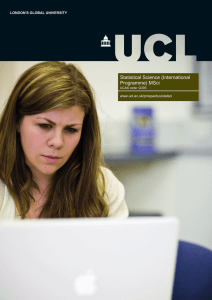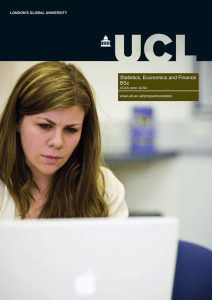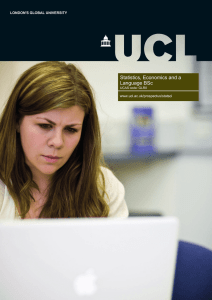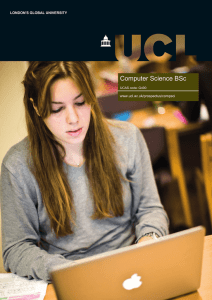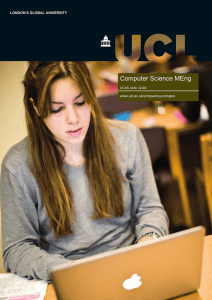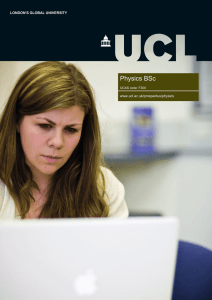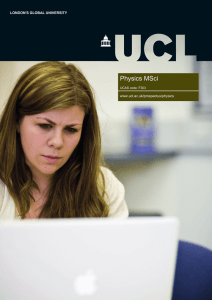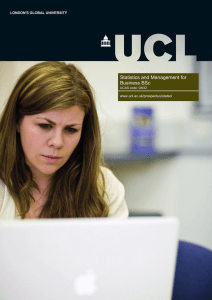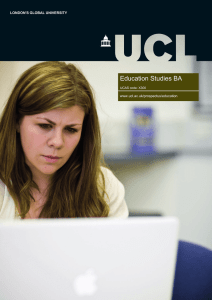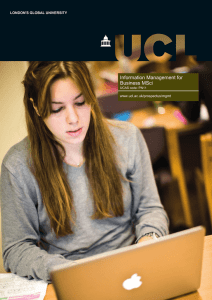Statistics BSc LONDON'S GLOBAL UNIVERSITY www.ucl.ac.uk/prospectus/statsci UCAS code: G300
advertisement
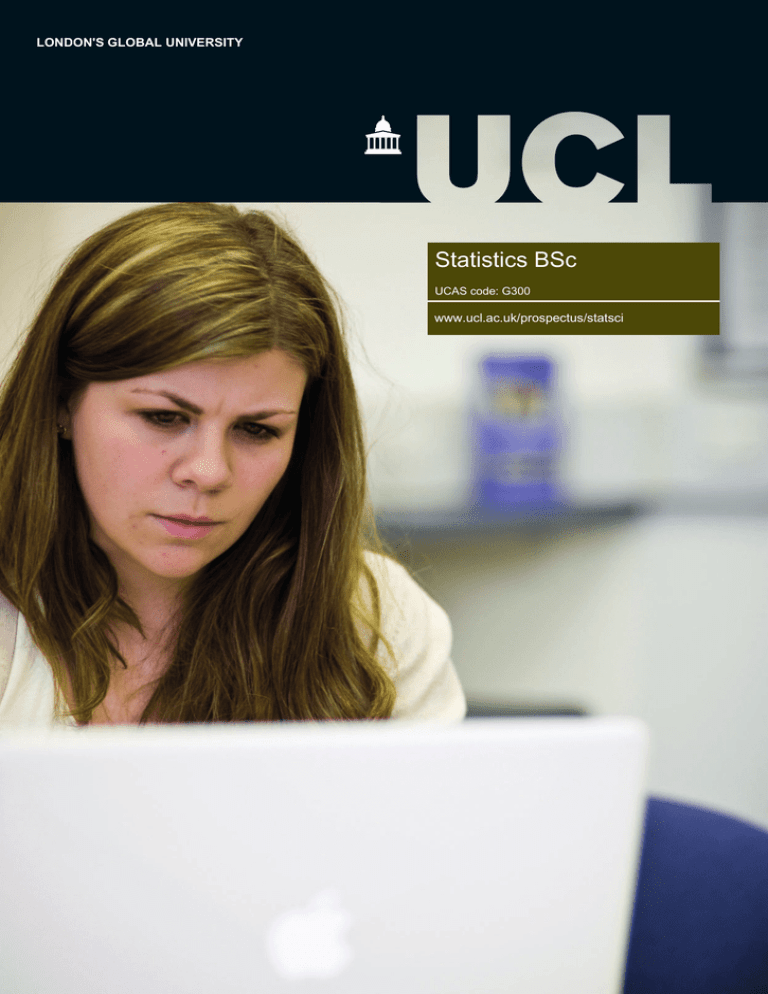
LONDON'S GLOBAL UNIVERSITY Statistics BSc UCAS code: G300 www.ucl.ac.uk/prospectus/statsci Statistics BSc This programme is accredited by the Royal Statistical Society and provides a broad, thorough and intellectually challenging training in the theory and practice of statistical science. Skills in statistics are valued by a variety of employers and can be applied to various problems in science, medicine, technology, finance and economics. Degree summary • The programme allows considerable flexibility through the choice of optional courses, and it may be possible to choose some courses from other UCL departments. • The department offers a friendly and supportive atmosphere, where small-group teaching and personal attention are available for all students. • The programme is accredited by the Royal Statistical Society (RSS) enabling you to be granted Graduate Statistician (GradStat) status if you achieve second-class honours or above. • Teaching is enhanced by the varied research interests of our academic staff; from the foundations of the subject to applications of statistics in science, medicine, industry, economics and finance. Your first year will include mathematics, statistics and some computing, which will be followed by increasing specialisation in statistics in the second and third years. In the third year, about one-quarter of your work will be on a project involving extensive research and the preparation of a report. Some examples of project topics are: analysis of rainfall patterns in southern Africa, an analysis of data from a clinical trial and an analysis of volatility in financial markets. Over the whole three years, theoretical studies are balanced with an emphasis on practical work (including the use of computers) and realistic illustration of theoretical concepts. The final year places special emphasis on applications in areas such as medicine and finance. However, by a suitable choice of topics, it is possible to bias your programme towards either the more mathematical or the more applied aspects of the subject. Your learning We employ a variety of teaching methods which include lectures, small-group tutorials, problem classes and computer workshops. Lecturers have regular 'office hours' during which you are welcome to come and ask questions about the course material. Most courses are examined at the end of the academic year in which they are taken using a combination of end-of-year examinations and in-course assessment. Prizes may be awarded to the most outstanding students in the first, second and third year. Your career Together with subject-specific knowledge, the programme is designed to equip you with skills valued by employers including: advanced numeracy and quantitative skills, analytical and problem-solving skills, and computing skills. You will also develop your research skills, communication skills and word processing skills through statistical project work. The demand for graduates with training in statistical science is now a permanent feature in both advanced and developing countries for jobs in finance, commerce, industry, research, education and government. Graduates from this department are well-represented in all these fields, in this country and overseas, and recent graduates have continued to be successful in obtaining a wide variety of jobs. Popular career choices of previous graduates include the financial sector, training in the actuarial or accountancy professions and jobs in industry and commerce. Postgraduate study, for example in advanced statistics, medical statistics, actuarial science, finance or economics, provides further options. First career destinations of recent graduates (2010-2013) of this programme include: • • • Full-time student, London School of Hygiene and Tropical Medicine Trader, Global Hunter Securities Graduate Scheme Executive Management, HSBC Degree structure In each year of your degree you will take a number of individual courses, normally valued at 0.5 or 1.0 credits, adding up to a total of 4.0 credits for the year. Courses are assessed in the academic year in which they are taken. The balance of compulsory and optional courses varies from programme to programme and year to year. A 1.0 credit is considered equivalent to 15 credits in the European Credit Transfer System (ECTS). Year One Compulsory courses Introduction to Probability and Statistics Introduction to Practical Statistics Further Probability and Statistics Mathematics for Students of Economics, Statistics and Related Disciplines I Mathematics for Students of Economics, Statistics and Related Disciplines II Optional courses You will select 1.5 credits from a wide range of optional courses. Options may include: A Foreign Language module (Arabic, Dutch, French, German, Italian, Japanese, Mandarin or Spanish – all levels from beginner to advanced available Analysis 1 Introduction to Science Communication Introduction to Science Policy Studies Philosophy of Science Writing in Academic Contexts Other approved undergraduate course options Year Two Compulsory courses Computing for Practical Statistics Introduction To Applied Probability Linear Models and the Analysis of Variance Mathematics for Students of Economics, Statistics and Related Disciplines III Probability and Inference Optional courses You will select 1.5 credits of optional courses, including at least one of the following: Optimisation Algorithms in Operational Research Social Statistics Remaining credits can be selected from a wide range of undergraduate course options. Final Year Compulsory courses Statistical Inference Statistical Science Project Optional courses You will select 2.5 credits from a wide range of optional courses. Options may include: Factorial Experimentation Forecasting Medical Statistics I Medical Statistics II Optimisation Algorithms in Operational Research Social Statistics Stochastic Methods in Finance I Stochastic Methods in Finance II Stochastic Systems Other approved undergraduate course options Entry requirements A levels A level grades A*AA-AAA/A*AB A level subjects A* in Mathematics, or AA in Mathematics and Further Mathematics, is required. Applicants offering A*AB including A*A in Mathematics and Further Mathematics respectively will also be considered. AS levels For UK-based students a pass in a further subject at AS level or equivalent is required. GCSE English Language and Mathematics at grade C. For UK-based students, a grade C or equivalent in a foreign language (other than Ancient Greek, Biblical Hebrew or Latin) is required. UCL provides opportunities to meet the foreign language requirement following enrolment, further details at: www.ucl.ac.uk/ug-reqs mathematics, an informed interest in all the components of your chosen degree programme and good communication skills. Attendance at an open day may be required; in special cases, candidates may be interviewed. We will decide whether to invite you to an applicant open day on the basis of our assessment of your application. Your visit will include an opportunity to meet staff and current undergraduates, a tour of UCL, a taster lecture and introductory talks about the department and degree programmes. Fees UK/EU fee £9,000 (2016/17) Overseas fee £18,830 (2016/17) Notes Details about financial support are available at: www.ucl.ac.uk/study/ug-finance Contacts Contact IB diploma IB points 38-39 Subjects A score of 18-19 points in three higher level subjects including grade 7 in Mathematics, with no score lower than 5. Other qualifications Full lists of all degree programmes and other entry requirements can be found on our website at: www.ucl.ac.uk/otherquals Undergraduate Preparatory Certificates UCL's Undergraduate Preparatory Certificates (UPCs) are intensive one-year foundation courses for international students of high academic potential, who are aiming to gain access to undergraduate degree programmes at UCL and other top UK universities. For more information see our website: www.ucl.ac.uk/upc Your application Application for admission should be made through UCAS (the Universities and Colleges Admissions Service). Applicants currently at school or college will be provided with advice on the process; however, applicants who have left school or who are based outside the United Kingdom may obtain information directly from UCAS. When we receive your application we will consider your academic record, your predicted grades, your personal statement and your reference. Your application should demonstrate high academic ability, particularly in PDF Updated: February 19, 2016 Information correct at time of going to press. See website (www.ucl.ac.uk/prospectus/statsci) for latest information Dr Yvo Pokern Admissions Tutor Email undergraduate-admissions@ucl.ac.uk Telephone +44 (0)20 3108 4400 Prospectus entry www.ucl.ac.uk/prospectus/statsci Key facts REF 82% rated 4* (‘world-leading’) or 3* (‘internationally excellent’) Department Statistical Science Faculty Mathematical & Physical Sciences
